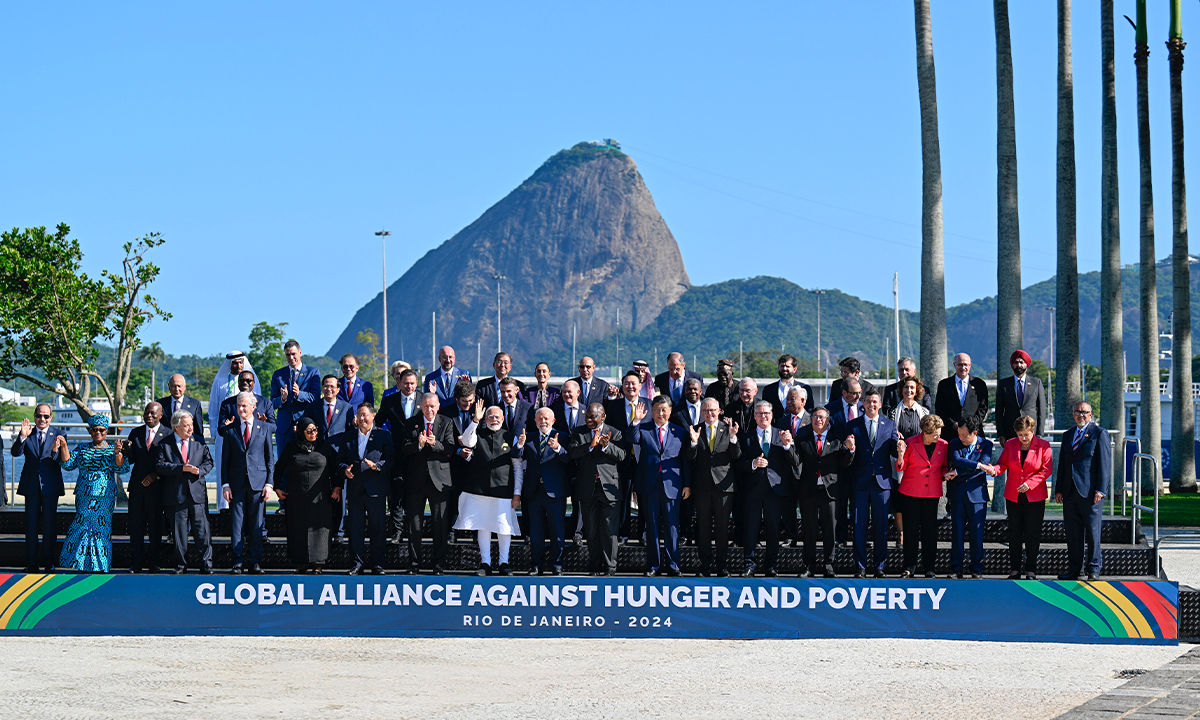
Chinese President Xi Jinping (ninth from right) and other leaders attending the 19th G20 Summit pose for a group photo for the Global Alliance Against Hunger and Poverty initiated by Brazil in Rio de Janeiro, Brazil on November 18, 2024. Photo: Xinhua
Chinese President Xi Jinping has met with a number of leaders on the sidelines of the 19th G20 Leaders' Summit held in Rio de Janeiro, Brazil, underscoring the world's recognition of China's role as a powerful and stabilizing force amid global geopolitical uncertainties as well as China's significant contribution to promoting development globally.
In meeting with German Chancellor Olaf Scholz on Tuesday on the sidelines of the G20 Leaders' Summit, Xi said as the second and third largest economies in the world, China and Germany are both major countries with significant influence. The two countries need to view and develop bilateral relations from a long-term and strategic perspective.
China regards Germany as an important partner in advancing Chinese modernization, and will continue to provide broad market opportunities for German companies.
Xi also said China and Germany share highly integrated economic interests, and bilateral cooperation is an opportunity for shared development and common future.
The EU's tariffs on Chinese electric vehicles are drawing attention around the world, and China always insists on resolving differences through dialogue and consultation. It is hoped that Germany will continue to play an important role in this regard, Xi said.
On Tuesday, Xi also met with French President Emmanuel Macron on the sidelines of the G20 Leaders' Summit. Xi said China-France relations are of unique strategic significance and global influence as both are independent, mature and responsible major countries.
China is willing to work with France to make greater contribution to the sound development of China-Europe relations and world peace and stability, Xi said.
While meeting with British Prime Minister Keir Starmer on Monday, Xi said China and Britain should adopt a rational and objective perspective on each other's development.
The two countries should enhance strategic communication and deepen political mutual trust to ensure a steady, substantial, and enduring development of bilateral relations, he said.
In meeting with Australian Prime Minister Anthony Albanese on Monday, Xi said there is no fundamental conflict of interests between China and Australia.
As long as the two sides adhere to mutual respect, treat each other as equals, and seek common ground while shelving differences, China-Australia relations will surely develop well, Xi said.
Noting that both China and Australia are supporters and defenders of economic globalization and free trade, he urged the two sides to promote the sharing of opportunities and benefits among various countries via opening up, so as to realize common development.
In meeting with Mexican President Claudia Sheinbaum Pardo on Monday, Xi said that China and Mexico should continue to enhance exchanges, renew friendship, make good use of the highly complementary nature of the two economies, constantly advance practical cooperation and push for all-round development of bilateral relations in the new era.
Xi once again congratulated Sheinbaum on becoming the first female president in the history of Mexico, and recalled his visit to Mexico in 2013, which he said had left a deep and unforgettable impression.
Highlighting the two countries' time-honored traditional friendship, Xi said China and Mexico share similar views and ideas on many international issues, and both countries advocate a universally beneficial and inclusive economic globalization.
Force of stability The world is currently grappling with a profound sense of uncertainty, prompting major world leaders to adopt a dynamic approach to diplomacy. The meetings between the Chinese leader and several leaders from other countries underscore the world's perception of China as a powerful and stabilizing force in the face of global geopolitical uncertainties, Zhu Jiejin, a professor of global governance studies at Fudan University, told the Global Times.
The series of meetings also shows that China is primarily seeking to maintain stability amid the ever-changing international landscape; moreover, China's main contribution on the current international stage is promoting development, which is also why China's international influence is expanding, said Zhu.
In his speech at Session I of the 19th G20 Summit on Fight Against Hunger and Poverty on Monday, Xi said from Hangzhou to Rio, we have been working for one and the same goal, that is, to build a just world of common development.
To build such a world, we need to channel more resources to such fields as trade, investment and development cooperation, and strengthen development institutions. There should be more bridges of cooperation, and less "small yard, high fences," so that more and more developing countries will be better off and achieve modernization, the Chinese president said.
To build such a world, we need to support developing countries in adopting sustainable production and lifestyle, properly responding to challenges like climate change, biodiversity loss and environmental pollution, enhancing ecological conservation, and achieving harmony between man and nature, Xi said.
Zhu said that under the backdrop of rising protectionism, China has been actively advocating win-win cooperation and expanding its international "circle of friends" through active participation in international cooperation.
China's presence in Latin America has made an increasingly important impact, particularly in trade, investment, and infrastructure. Today, China is an essential partner for the region, a major importer of agricultural and mineral commodities, and a key source of financing and technology. This relationship offers alternatives that once depended primarily on the US and Europe, Ronnie Lins, a Brazilian economist and director of the China-Brazil Center for Research and Business, told the Global Times when talking about the impact China's presence has had on the economies and societies of Latin American countries.
Within the Global South, the China-Latin America partnership represents a model of autonomous and reciprocal development, contrasting with traditional dependence on Western powers. This partnership encourages other Global South countries to pursue mutually beneficial horizontal relationships, supporting a new multipolar order, said Lins.




